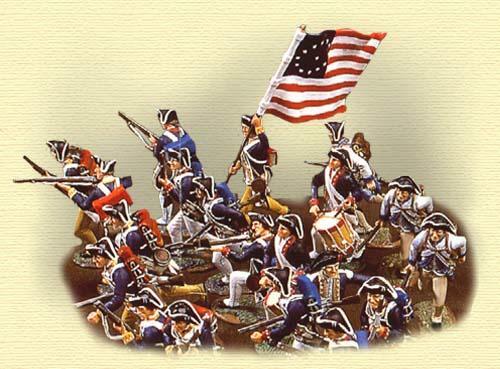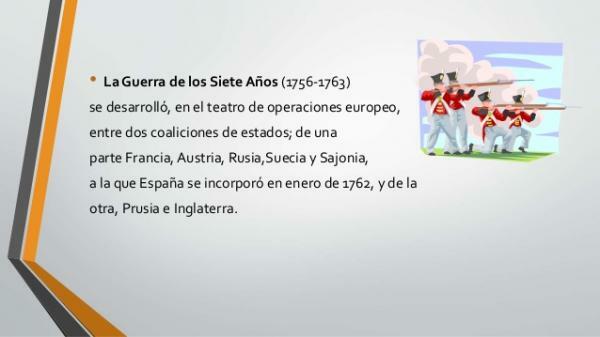Background to the independence of the 13 colonies

Image: Learning History - WordPress.com
At present, the greatest economic power in the world is the United States, which over the years has achieved enormous influence in much of the world. But the history of the United States has not always been this way, since for many years it was only a british colony, and could only become independent after the first liberal revolution in history. To learn more about this event, in this lesson from a TEACHER we are going to talk about the background of the independence of the 13 colonies.
Index
- What were the Thirteen Colonies?
- The 7-year war and the beginning of tensions
- The Tea Party and the beginning of independence
What were the Thirteen Colonies?
Before the arrival of the Europeans, North America was inhabited by a series of pre-Columbian cultures, being all those peoples that we call Indians or natives. The arrival of the Europeans began a slow conquest of many territories in the area, being a long period in which
the British were founding colonies through the area, the first of all being that of Jamestown in 1607, located in what we now call Virginia.Over the years, the British were conquering areas dominated by the natives, in which colonies were founded due to the arrival of British immigrants who were looking for a better life away from home. The colonies created by these Englishmen were called the Thirteen Colonies, and they became one of the greatest economic sources of the British Empire, one of the greatest empires in the history of mankind.
The Thirteen Colonies were separated from each other, being independent from each other, but their closeness, their remoteness with the metropolis, and the similarity in terms of society, made all of it feel a kind of fellowship. These 13 colonies were as follows:
- New Hampshire
- Rhode Island
- Connecticut
- New York
- Pennsylvania
- New Jersey
- Delaware
- Maryland
- Virginia
- North Carolina
- South Carolina
- Georgia
- Massachusetts

Image: LHistoria
The 7-year war and the beginning of tensions.
Many are the Causes of the independence of the 13 colonies but the 7-year war is always used as the starting point of the tensions between the colonies and the English metropolis.
The 7 years warIt was a conflict that faced some of the greatest European powers of the time, such as the English, the French or the Prussians. The war had its center in Europe, but over time it also became a struggle for the predominance of the colonies in Asia and America, being an important part the battles between France and England in the north of America. The 13 colonies also participated in the conflict, who formed colonial battle groups to help their metropolis, thereby seeking a kind of economic compensation.
After years of war the English were victorious, but the conflict had serious economic consequences, the The empire had lost too much money after years of battles and so taxes were raised on the colonies. The highest tax increases were for the 13 colonies, since they were the ones with the highest production, but that was not well seen by the colonists. Not only had they not been rewarded for their help in the war, but also after years of battles they saw how the English monarch decided to increase many of the taxes on basic products. Some of these taxes and laws were as follows:
- Tea Law: This English law allowed the East India Company sell in the Thirteen Colonies without having to pay any type of tax.
- Sugar Law: The English doubled the sugar taxes in the North American colonies.
- Declaratory law: The English could force the colonists to follow whatever law they created.
- Seal Law: All the products marketed in the 13 colonies had to bear the English seal.
- Townshend Laws: A series of laws that increased taxes on a wide variety of products, such as paint or lead.
All these measures were not well received by the colonists, creating the first great tensions between the metropolis and the 13 colonies. It was after this that the first settlers rebelled, which caused the spark that started the revolution.

Image: Slideshare
The Tea Party and the beginning of independence.
To conclude this lesson on the antecedents of the independence of the 13 colonies, we must talk about the tea riot and the rest of the events that started the revolution of the 13 colonies.
The new one Tea Law caused some settlers to want to make a kind of symbolic act against the metropolis, so in 1773 a group of Americans boarded one of the ships that carried the tea, and threw the merchandise into the sea. This act of protest is considered as the spark that started the revolution, being the first time that the settlers showed their discontent so clearly, and the first time the English became aware of the situation caused by the taxes. This important event was called the Tea Riot.
The english government increased the number of repressive measures against the colonies, but the act of tea had served as an example, and other settlers carried out similar actions such as the burning of the ship Peggy Stewart. The situation became more complicated, and there were more and more signs of the American revolution.
Shortly after, the Continental Congress was convened, beginning the War of Independence of the United States which would end with the end of the 13 colonies, and the birth of the United States.

Image: Slideshare
If you want to read more articles similar to Background to the independence of the 13 colonies, we recommend that you enter our category of Story.


